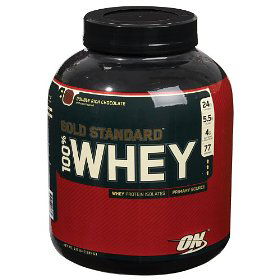Whey Protein
What is Whey Protein?
As mentioned earlier, whey protein is a high quality protein supplement derived from cow's milk. Milk contains two types of proteins- Casein and Whey Protein in the ratio of 80:20 respectively. Technically speaking, whey protein is a mixture of globular proteins isolated from whey, the liquid material created as a by-product of cheese production. The casein (or curd) and a portion of the milk-fat are churned out to make cheese. Many specialty filters are used to separate whey protein from the remaining liquid whey. The concentrated liquid is then further concentrated to get pure whey protein. It is then dried and packed to be sold as whey protein powder.

How is whey protein made?
A: Whey protein is a co-product of the cheese making process. Listed below is a brief description of the steps involved in making BiPro pure whey protein isolate.
1. Fresh milk is tested, approved by Quality Assurance experts and pasteurized.
2. The casein, or "curd", and a portion of the milk-fat are separated out to make cheese.
3. The remaining liquid whey goes through a series of fine, specialty filters to separate the whey protein from the lactose and other ingredients in the liquid whey.
4. Concentrated liquid whey enters an ion exchange tower to further concentrate and purify the whey protein. Ion exchange is a gentle process and does not denature, or "break down", the whey protein.
5. Next, the product enters a drying tower to remove water.
6. The final step is to package the pure whey protein isolate powder into various size containers for use.
Why do I need protein?
A: Protein is an important nutrient needed by everyone of a daily basis. It is made up of essential and non-essential amino acids, which are the "building blocks" for healthy bodies. Protein has a number of different roles in the body including the following:
* Repair body cells
* Build and repair muscles and bones
* Provide a source of energy
* Control many of the important processes in the body related to metabolism
Biological value of whey vs other protein sources.
Biological value, or BV, is the measure of the efficiency of a protein and how it can be absorbed and used by the body for growth -- higher the number, the higher the efficiency. It’s a common term in bodybuilding and one that is used to classify whey protein. With BV, egg protein sets the standard with 100. Beef can be found at around 75, for example. With whey protein, however, BV can be as high as 170.
Whey protein isolate has the higest bioavailability of the whey sources, generally about 30-60% more than concentrate.
Pros of Whey Protein Isolate:
* Purest form of whey protein available
* Fat free, lactose free, carb free
* Excellent amino acid profile
* More protein per serving
* Ideal for both muscle building & fat loss
Fitness Diet
The online resource for diet and fitness including weight loss, low fat recipes, vitamins and minerals, nutrition, health and fitness. We have produced health, diet and fitness information along with a large selection of health calculators including an ideal weight calculator which estimates the time taken to achieve your ideal weight and a calories burned calculator. We also have a special body fat percentage section to estimate your body fat based on bmi, skinfolds or body dimensions. Why not Visit our new section on Fitness Vacations
A crucial component of developing your fitness is paying attention to what you eat day to day. Here’s a few tips for fitness and diet to help you reach your goals:
Aiding proper recovery
Increasing your fitness level involves adaptive responses occurring within your body in the aftermath of the physical exertion you subject your body to. So if your workout incorporated strength training and hypertrophy, then to get the most out of your physical work you need to consume a fuel mix which your body can breakdown and get to your muscles quickly, and you need this without delay. A lot of the carbs you consume at this time should be as simple sugars so your glycogen stores can be replenished quickly, thereby aiding muscle growth. The effect these simple sugars have on your insulin levels also has a sort of anabolic effect in turn, a separate benefit in its own right. Your proteins should be such that they can be digested quickly, and they should have a high biological value; whey protein fulfils both of these requirements. We recommend whey protein isolate, as it’s even more effective.
Prepare for your next workout
Paying close attention to your diet following a workout not only helps you get the most out of that session, as detailed in the paragraph above, but it provides you the opportunity to get even more out of your next workout. This can mean meticulous planning for every meal between one workout and the next, according to the nature of your training program.
Emotional well-being
Here’s one of the more seldom seen health and fitness tips, but we deem emotional health, diet, and fitness to all be closely related. What we eat can determine the way we feel, and thus our general quality of life. This is even more relevant when we are involved in vigorous physical activity. For example, depending on the training program you’re following you might have been encouraged to increase your protein intake: subject to your metabolic type this may not have the expected outcome anyway, and it could make you feel emotionally unwell in addition. Staying on top of this, and making changes as necessary, makes all the difference.
